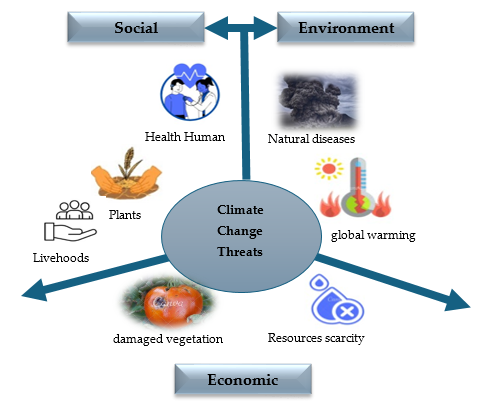ICT Innovative for Adapting and Mitigating Climatic Variability: Towards an Integrated Approaches for Sustainable Environment
Main Article Content
Abstract
The most significant threat to both human and planetary health is climate change, which is caused by changes in the weather and air quality on Earth because of human activities. The climate is changing on a global scale, which has effects on a variety of domains, notably transportation, agriculture, livestock and so on. The variability of climate threatens sustainability and its pillars for any nation. Evidence of that, regarding 68.5 million people were affected, and $131.7 billion in economic losses were incurred; storms, hunger, wildfires, and droughts contributed for almost 93% of these costs. Globally, the many effects of climate change have sparked research efforts to achieve sustainable development (SD). From a scientific standpoint, the concepts of “adaption” and “mitigation” have been embraced to treat obstacles of climate. Hence, the notion of information communication and technology (ICT) is embracing to mitigate and adapt climate variability. Accordingly, the evaluation and ranking alternatives of ICT where this is objective of our study. Herein, mutli-mriteria mecision making (MCDM) techniques are the primary factor in this study. As opinion weight criteria method (OWCM) utilized for analyzing ICT’s criteria and sub-criteria and obtaining its weights. Whilst these weights have been utilized in multi-attributive ideal-real comparative analysis (MAIRAC) to rank alternatives of ICT. Whilst Tree Soft Sets is leveraging for modeling ICT’S criteria and its sub-criteria. Essentially, these techniques have the ability to apply in uncertainty environment and incomplete information through supporting neutrosophic theory, which characterized with uncertainty theory especially, single value neutrosophic sets (SVNs) to construct soft decision maker (SDM) framework. Ultimately, the constructed SDM is applied in a real-world case study. The findings of SDM framework indicated that alternative1 (ALT1) is the optimal conversely (ALT2) is the worst alternative.
Downloads
Article Details

This work is licensed under a Creative Commons Attribution 4.0 International License.





